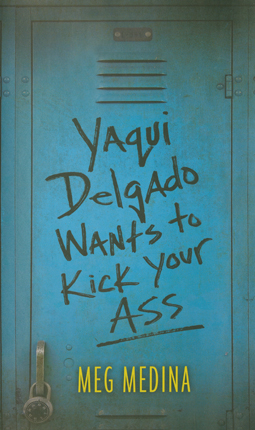Full Text Reviews: Bulletin for the Center... - 03/01/2013 “Yaqui Delgado wants to kick your ass” is one of the first things anybody says to sophomore Piddy Sanchez at her new school. Piddy is a good student with a serious future, miles apart from the suspension-happy Latina clique from the bad neighborhood—which is probably what gets under the skin of Yaqui, that clique’s ringleader (that and the fact that Yaqui’s boyfriend has apparently noticed the curvy new girl). Yaqui’s laser focus on Piddy never seems to waver, and as her stealthy but effective bullying escalates, Piddy’s existence spirals down into a desperate and flunking misery that hits bottom when Yaqui and her girls give Piddy a substantial beatdown, filming it and posting it online. What makes this story so compelling is that it’s about Piddy in her entirety, not just about bullying; in fact, the book starts with Piddy’s lively narration focusing on her displeasure about the move and the ongoing friction with her strict mother. As Yaqui malignantly dominates Piddy’s life, she also dominates the book, so readers share Piddy’s experience of swiftly descending from normal to nightmare. Medina emphasizes Piddy’s acute sense of isolation without overplaying it, and she absolutely respects the totality of Piddy’s quandary, knowing that ham-fisted adult involvement will only make things worse. Indeed, there’s no great resolution here: Piddy ends up with a safety transfer back to her old school and some philosophical perspective on life’s unfairness but no illusions about being better for the incident. The message here is that tough and unfair stuff is really tough and unfair, but it’s also survivable; that’s a takeaway that readers will recognize as both true and valuable. DS - Copyright 2013 The Board of Trustees of the University of Illinois. School Library Journal - 04/01/2013 Gr 7 Up—Piedad Sanchez moved at the beginning of her sophomore year, and a few weeks into classes at her new school a girl comes up to say that "Yaqui Delgado wants to kick your ass." As a first line, it sets the focus for Piddy, who has always had friends, gotten good grades, and managed quite well in her old school. There's no real reason for the enmity, but the threat is more than real and begins to permeate Piddy's life. Gradually readers see that her mother's best friend, who works at a hair salon and has been her support, is the only adult who even has a clue about what is going on. The Queens, New York, neighborhood is solidly Hispanic and the language reflects the culture. Piddy does a downward spiral as the torment gets increasingly worse. The school reaction and the dilemma she faces are realistically portrayed. Yaqui can get to her in and out of school, and she is vulnerable to being terrorized by a whole group of Yaqui supporters. The way that the abuse and threats impact Piddy to try to become a bad girl herself is logically presented. The plight of a pair of abandoned kittens parallels her own loneliness and loss. The Latino cultural milieu adds a richness and texture that lifts this up above many problem novels. The plot points are dexterously intertwined, and the characters are distinct. A real bonus for those looking for a bullying book for older readers that is not simplistic.—Carol A. Edwards, Denver Public Library, CO - Copyright 2013 Publishers Weekly, Library Journal and/or School Library Journal used with permission. Booklist - 04/15/2013 When Piedad “Piddy” Sanchez hears that Yaqui Delgado is going to crush her, she has no idea why she has become a target of one of the roughest girls in her new Queens school. But Yaqui tells everyone Piddy is a skank who shakes her ass when she walks, and as the bullying escalates from threats to physical attacks, Piddy finds herself living in constant fear. A strong student with a bright future at her old school, Piddy starts skipping school, and her grades nosedive. After a truly upsetting attack on Piddy is uploaded to YouTube, she realizes this isn’t a problem she can solve on her own. Medina authentically portrays the emotional rigors of bullying through Piddy’s growing sense of claustrophobic dread, and even with no shortage of loving, supportive adults on her side, there’s no easy solution. With issues of ethnic identity, class conflict, body image, and domestic violence, this could have been an overstuffed problem novel; instead, it transcends with heartfelt, truthful writing that treats the complicated roots of bullying with respect. - Copyright 2013 Booklist. Loading...
|



